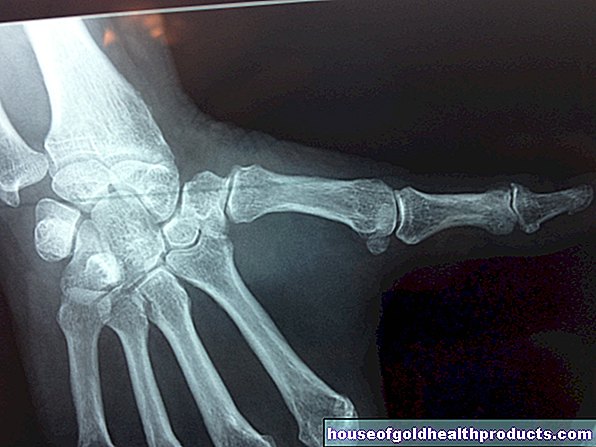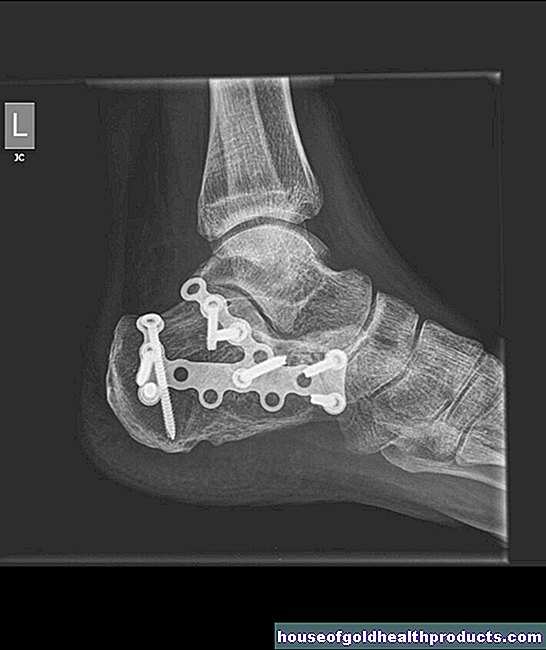Blood in the urine
and Carola Felchner, science journalistMarian Grosser studied human medicine in Munich. In addition, the doctor, who was interested in many things, dared to make some exciting detours: studying philosophy and art history, working on the radio and, finally, also for a Netdoctor.
More about the expertsCarola Felchner is a freelance writer in the medical department and a certified training and nutrition advisor. She worked for various specialist magazines and online portals before becoming a freelance journalist in 2015. Before starting her internship, she studied translation and interpreting in Kempten and Munich.
More about the experts All content is checked by medical journalists.Anyone who discovers blood in the urine (hematuria) should see a doctor. For example, it could be due to a urinary tract or kidney disease, or even a tumor (like bladder cancer). Sometimes the cause is quite harmless: Some foods (such as beetroot) can make the urine appear reddish and simulate bloody urine. To be on the safe side, you should always consult a doctor if you suspect blood in the urine. Find out more about the symptom "blood in the urine" here: causes, examinations, treatment.

Brief overview
- What is blood in the urine? Admixture of blood (more precisely: red blood cells) in the urine. Visible traces of blood (reddish colored urine) are called macrohematuria. Microhematuria is present if traces of blood are not visible in the urine.
- Causes: e.g. cystitis, urethritis, urinary stones, kidney inflammation, kidney infarction, injuries to the kidneys, bladder or urinary tract, tumors (such as bladder cancer, kidney cancer, prostate cancer), prostate inflammation, benign prostate enlargement, schistosomiasis, tuberculosis in the kidney area, systemic lupus erythematosus
- When to the doctor always, as serious illnesses can be behind the symptom
- Investigations: physical exam, blood and urine tests, imaging tests
- Treatment: depending on the cause, for example with antibiotics for bacterial infections, laser or shock wave therapy for urinary stones, surgery, chemotherapy or radiation therapy for tumors, etc.
Blood in the urine: causes
There is usually no blood in the urine. If it does, it indicates a disease or injury in the area of the urogenital system (system of the urinary and genital organs). If the blood in the urine can be seen with the naked eye (reddish colored urine), it is called macrohematuria. However, if the amount of blood in the urine is so small that it can only be detected with test strips or other examination methods, then there is microhematuria.
In most cases, the causes of blood in the urine are in the lower urinary tract or kidneys:
- Urinary tract infections: Urinary tract infections such as cystitis and urethritis are common causes of blood in the urine. In addition, patients often complain of a burning sensation when urinating.
- Urinary stones: Larger bladder, urethral and ureter stones in particular can irritate and injure the mucous membrane in the urinary tract and thus trigger hematuria. Colic-like pain in the abdomen can also occur. Depending on the location of the stone, there may be pain in the back or in the flanks, for example.
- Kidney inflammation: These include inflammation of the kidney corpuscles (glomerulonephritis), interstitial nephritis and inflammation of the renal pelvis (pyelonephritis). All three can cause blood in the urine, among other things.
- Kidney cysts: Cysts are fluid-filled cavities that can form in various organs, including the kidney. Sometimes they only occur individually and then usually do not cause any symptoms. However, the kidney can also have a large number of cysts. Such a cyst kidney is a genetic disease that can cause hematuria, among other things.
- Kidney infarction: This is when a blood clot blocks a kidney artery (kidney infarction). Those affected feel sudden pain in the flank. If a larger part of the kidney tissue is cut off from the oxygen supply due to the vascular occlusion, abdominal pain, nausea and vomiting can result. After a few days, blood appears in the urine as a sign of acute kidney failure.
- Renal vein thrombosis: Similar to a kidney infarction, a blood clot blocks a kidney vessel - but a vein and not an artery. Acute flank pain and blood in the urine are typical signs.
- Bladder schistosomiasis: The tropical disease schistosomiasis (schistosomiasis) is caused by an infection with pair of leeches. There are various types of these parasites that can cause schistosomiasis. Some of them prefer to lay their eggs in the veins of the urinary bladder. The sign of this bladder schistosomiasis is blood in the urine. As the disease progresses, the urge to urinate and urinary incontinence may become more frequent.
- Other infections: Some other parasitic as well as bacterial infections can explain blood in the urine. These include so-called urogenital tuberculosis - a tuberculosis disease that manifests itself in the urinary tract and genital organs and is triggered by tubercle bacteria.
- Tumors: Sometimes blood in the urine is due to a malignant tumor in the urinary tract. This can be bladder cancer, urethral cancer, ureter cancer or kidney cancer (such as renal cell carcinoma).
- Other urinary tract and kidney diseases: Sometimes diverticula or polyps of the bladder or urethra cause hematuria. Diverticula are wall bulges, polyps are usually benign growths of the mucous membrane.Other possible causes are, for example, constrictions at the exit of the bladder or in the urethra as well as kidney damage in the context of high blood pressure or diabetes (diabetic nephropathy).
- Injuries: A traffic accident, knife stab, fall or blow can injure the urinary tract, bladder or kidneys. Then blood often mixes in the urine.
In addition, blood in the urine can have other causes as well. These include, for example:
- Prostate diseases: If blood is found in the urine of a man, it may indicate a problem with the prostate, such as an inflammation of the prostate (prostatitis) or a benign prostate enlargement (benign prostatic hyperplasia). Bleeding varicose veins of the prostate (prostate varices) and prostate cancer can also make themselves felt as blood in the urine.
- Systemic lupus erythematosus: This autoimmune disease can affect various organs, including the kidneys. These then become inflamed (lupus nephritis), which can be associated with hematuria.
- Wegener's granulomatosis: This disease, also known as Wegener's disease, is associated with chronic inflammation of blood vessels. In addition, small skin nodules (granulomas) form in the area of the inflammatory processes. If the vessels of the kidneys are affected by the disease, visible traces of blood result in the urine (macrohematuria).
- Medicines: Certain medicines can also cause blood in the urine as a side effect. This applies to some antibiotics (such as penicillins), cancer drugs (cytostatics) and blood thinners (such as acetylsalicylic acid, phenprocoumon).
By the way: Doctors speak of glomerular hematuria if the cause is in the kidney corpuscles (glomeruli), such as glomerulonephritis. The glomeruli represent the first filter station in urine production: this is where the primary urine is pressed out of the blood.
If, on the other hand, the red blood cells only get into the urine in subsequent sections of the urinary tract (e.g. due to bladder stones or ureter inflammation), it is a question of postglomerular hematuria.
Reddish colored urine: Not always hematuria
What appears to be blood in the urine can also turn out to be something other than high levels of red blood cells (erythrocytes). Sometimes the increased excretion of hemoglobin (the red pigment in the blood in the erythrocytes) is what causes the urine to turn red-brown in color. Doctors speak of hemoglobinuria in this case. It can occur, for example, after a blood transfusion or after strenuous exercise (such as a long walk) or as part of a poisoning or allergic reaction. Other possible causes include certain infections (such as malaria) and hereditary diseases.
A red-brown discoloration of urine can also be caused by what is known as myoglobinuria. This means the increased excretion of the protein myoglobin with the urine. Myoglobin is the red muscle pigment found in skeletal and heart muscle cells. If such cells perish in large numbers due to injury or illness (for example in the event of a heart attack), a large amount of myoglobin is released into the blood (myoglobinemia) and subsequently excreted with the urine.
A completely harmless and temporary red coloration of the urine can result from the consumption of certain foods (such as beetroot).
In addition, some medications can discolor the urine in such a way that blood is suspected. This applies, for example, to the antibiotic rifampicin.
If a woman notices blood in the urine during menstruation, it may be mixed with menstrual blood.
The color of the urine provides clues
Blood in the urine: when do you need to see a doctor?
A clear case: Anyone who notices blood in the urine should definitely and always see a doctor. Regardless of whether there are additional symptoms such as pain or not. It is important to clarify the cause and treat accordingly. This is especially important when a serious condition such as bladder cancer is responsible for the blood in the urine.
Doctor-patient conversation
At the beginning there is a detailed discussion between the doctor and the patient in order to collect the medical history (anamnesis). For example, the doctor asks:
- When did you notice the blood in your urine? Have you had this before?
- Do you have any other complaints (pain, fever, frequent urination, etc.)?
- Do you have any previous illnesses (such as lupus erythematosus)?
- Have you recently had an accident or were you injured in any other way (e.g. in a fight)?
- Are you currently taking any medication? If yes, which?
This information will help the doctor narrow down the possible causes of the blood in the urine.
Physical examination
The anamnesis is followed by a physical examination. The doctor will measure the patient's blood pressure and body temperature, among other things. He also feels and pats the stomach and flanks. If the patient complains of pain in the flanks, for example, kidney disease may be behind it.
Blood and urine test
The doctor can subject a urine sample from the patient to a rapid urine test on site. In doing so, he checks whether an increased number of red blood cells is actually being excreted in the urine. He sends the patient's urine and a blood sample to a laboratory for further analysis. The analysis can, for example, provide evidence of a urinary tract or kidney disease or an infection as the cause of the blood in the urine.
Imaging procedures
The kidneys, bladder and prostate can be easily examined with the help of ultrasound. The doctor can assess the renal pelvis and ureter using X-rays. Computed tomography (CT) and magnetic resonance imaging (MRI) may be useful to rule out tumors above the bladder. In the case of the bladder and urethra, a urethrocystoscopy is used.
Tissue samples
If there is a suspicion of a tumor or another disease that the doctor would like to determine in more detail, he may take tissue samples (biopsies).
Blood in the urine: treatment
Once the cause of the blood in the urine has been clarified, it can be treated specifically. Some examples:
- If you have a bacterial urinary tract infection, your doctor will prescribe antibiotics. The same applies to inflammation of the kidney pelvis.
- In the case of inflammation of the kidney corpuscles (glomerulonephritis), drugs that suppress the immune system (such as glucocorticoids or ciclosporin) are usually used. Such immunosuppressants will also help when an autoimmune disease (such as lupus erythematosus) is causing the blood in the urine.
- Urinary stones (kidney, bladder, ureter and urethral stones) can sometimes be resolved with medication. In other cases, they are removed as part of a procedure (such as a cystoscopy). Larger stones are often shattered with lasers or shock waves before they are removed or before they come off naturally (with the urine).
- In the case of bladder schistosomiasis, the causative agent of which is flukes, the doctor gives a remedy for the worms (anthelmintic).
- Diverticula and polyps in the bladder or urethra are surgically removed.
- For a malignant tumor, depending on its type and stage, various treatment methods can be considered, including surgery, chemotherapy, and radiation therapy.
- If certain drugs are the trigger for the blood in the urine, these must be discontinued if possible and / or replaced by alternatives that are more kidney-friendly.
Blood in the urine: you can do it yourself
Once you've discovered blood in your urine, the best thing you can do to begin with is to see a doctor. Once the cause of the hematuria has been determined, the patient can support medical treatment if necessary. For example, if you have kidney inflammation, it is advisable to take physical care and eat a low-protein diet. Talk to your doctor about how you can support the therapy of blood in urine in a meaningful way.
In addition, everyone can do something to prevent various causes of hematuria. For example, with the right diet, a healthy body weight and regular exercise, high blood pressure and diabetes mellitus can be prevented. Both of these promote kidney disease and thus the appearance of blood in the urine.
It is also advisable not to use nicotine: Among other things, smoking promotes the development of cancer in the urinary tract and also weakens the immune system, which can lead to urinary tract infections, for example.
In general, you should drink enough (non-alcoholic) drinks - experts recommend at least 1.5 to 2 liters per day. This helps keep the kidneys and urinary tract healthy, preventing blood in the urine (and worse).
Additional information
Guidelines:
- Guideline "Invisible Hematuria" of the German Society for General Medicine and Family Medicine






























